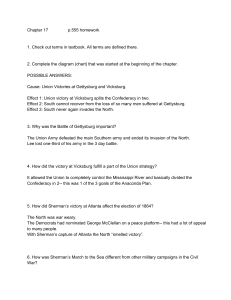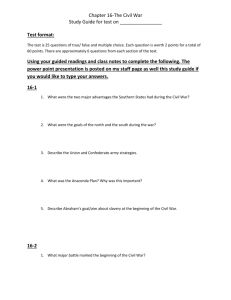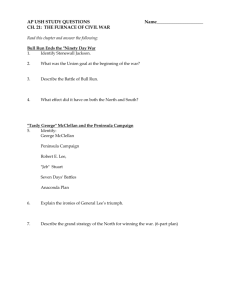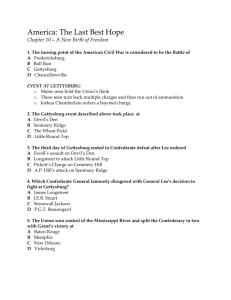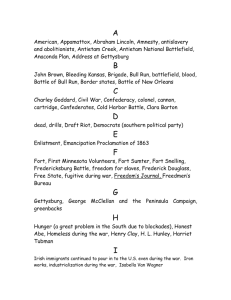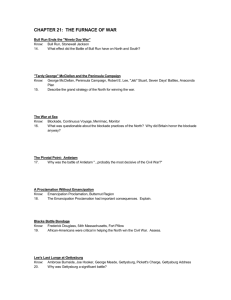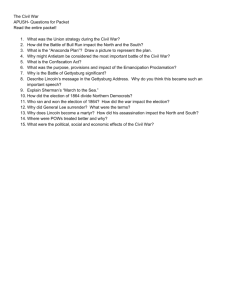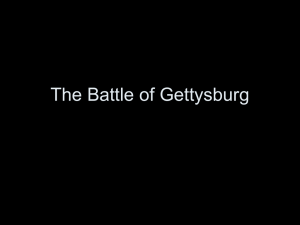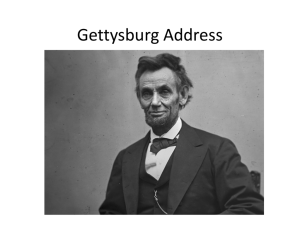Gettysburg - 150 years lalter
advertisement
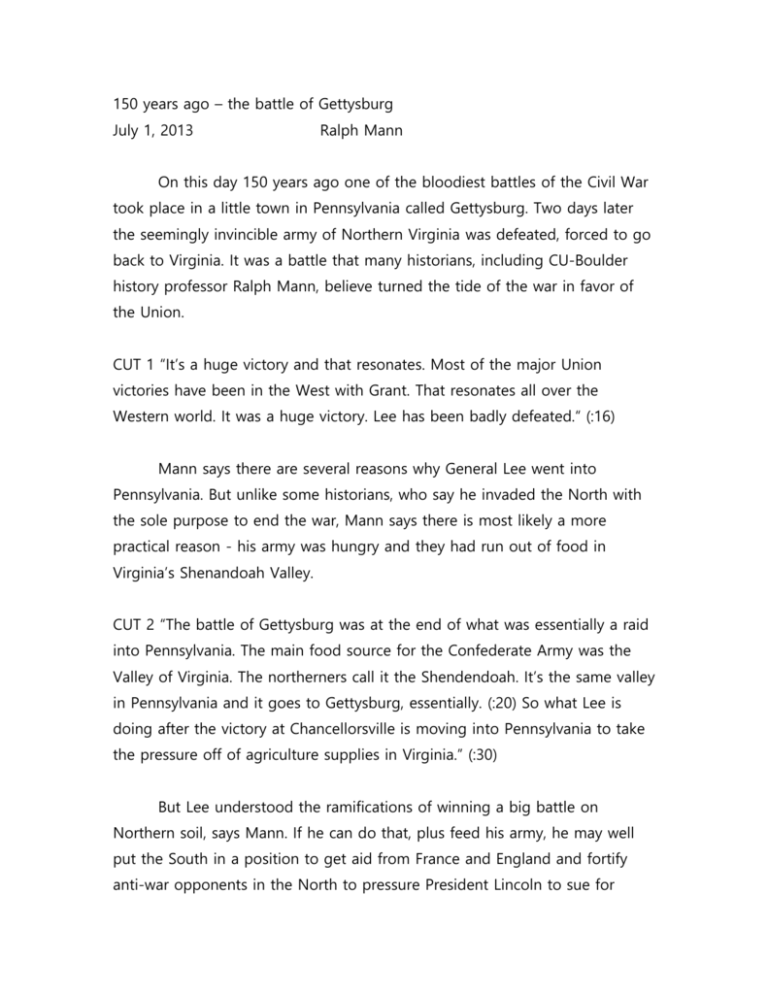
150 years ago – the battle of Gettysburg July 1, 2013 Ralph Mann On this day 150 years ago one of the bloodiest battles of the Civil War took place in a little town in Pennsylvania called Gettysburg. Two days later the seemingly invincible army of Northern Virginia was defeated, forced to go back to Virginia. It was a battle that many historians, including CU-Boulder history professor Ralph Mann, believe turned the tide of the war in favor of the Union. CUT 1 “It’s a huge victory and that resonates. Most of the major Union victories have been in the West with Grant. That resonates all over the Western world. It was a huge victory. Lee has been badly defeated.“ (:16) Mann says there are several reasons why General Lee went into Pennsylvania. But unlike some historians, who say he invaded the North with the sole purpose to end the war, Mann says there is most likely a more practical reason - his army was hungry and they had run out of food in Virginia’s Shenandoah Valley. CUT 2 “The battle of Gettysburg was at the end of what was essentially a raid into Pennsylvania. The main food source for the Confederate Army was the Valley of Virginia. The northerners call it the Shendendoah. It’s the same valley in Pennsylvania and it goes to Gettysburg, essentially. (:20) So what Lee is doing after the victory at Chancellorsville is moving into Pennsylvania to take the pressure off of agriculture supplies in Virginia.” (:30) But Lee understood the ramifications of winning a big battle on Northern soil, says Mann. If he can do that, plus feed his army, he may well put the South in a position to get aid from France and England and fortify anti-war opponents in the North to pressure President Lincoln to sue for peace. But Mann says Lee’s arrogance of invincibility my have cost him the battle. CUT 3 “Lee goes into that battle, he gambles, and he’s doing the attacks on the grounds that if this army is properly led the army of Northern Virginia can do anything. Well, no. So that whole thing about the invincible Confederate Army - the Army of Northern Virginia – Lee’s army – is badly damaged. (:19) So the defeat reverses all of those. Lee ends up back in Virginia with the same supply problems. He’s tied to the railroads. He’s tied to the valley. He can’t move around.” (:31) The defeat starts a chain of events that will ultimately spell defeat for the South less than two years later. After the North’s General Meade refused to chase after Lee’s army President Lincoln replaced him with General Grant, who, on that same day of Lee’s defeat, captures Vicksburg in the west. CUT 4 “At the same day of Gettysburg Grant completes the conquest of Vicksburg. He’s won all the battles and pretty quickly Lincoln’s got Grant superseding. (:13) Meade stays as commander of the Army of the Potomac but Grant is his commander – Grant is the overall commander. And so that was Meade’s last chance and from then on out it would be Grant’s type of war.” (:27) And Grant’s type of war is a war of attrition. A type of war the confederates can’t maintain. Gettysburg cost Lee a third of his army and the South did not have the resources to replace men nor supplies like the North could, says Mann. CUT 5 “The Confederacy is in real trouble there. In terms of killed and wounded at Gettysburg, Lee loses 30 percent. The Union army lost 20 percent. It was a hellish bloodbath but they have much more resources. (:17) The bleeding has Really started, and with Grant’s exhaustive campaign, keeping Lee under attack. Lee is in a position where he can’t replace men nearly as easily as Grant can.” (:29) The Union victory at Gettysburg also bolsters Lincoln’s popularity and resolve. Four months later his Gettysburg Address redefines the war as not just to save the Union but also to defend freedom and the republic, says Mann. CUT 6 “He talks about in the Gettysburg address. And so forever, what he does, is link that victory to a turning point in the war and to the ideals of the war – a new birth of freedom, anti-slavery, a government for the people, by the people. – but mostly the reestablishment of a republican government.” (:20) In all some 160,00 soldiers from the North and South fought at Gettysburg. After three days, roughly 51,000 men were either killed or wounded – making it the bloodiest battle of the Civil War. -CU-
